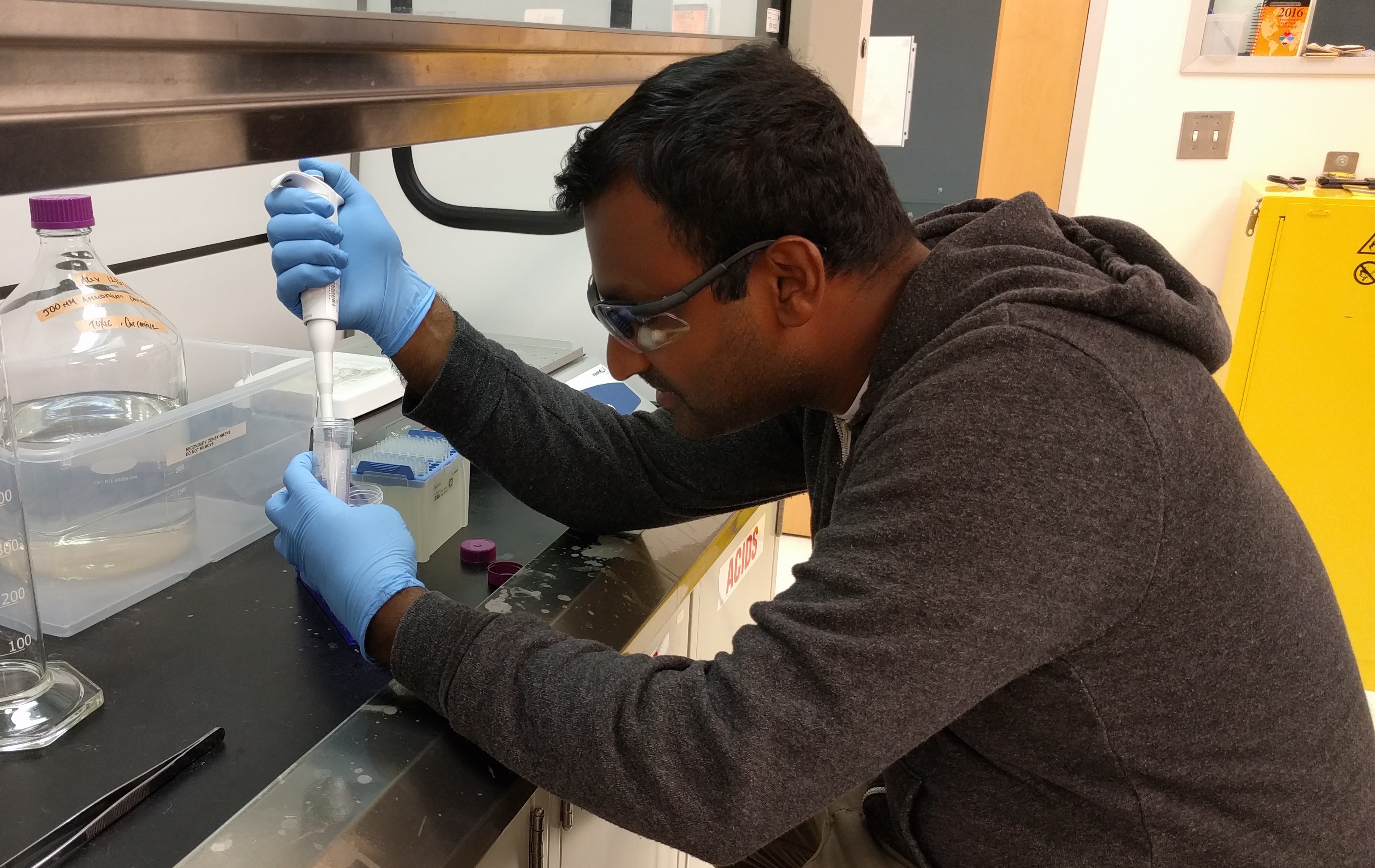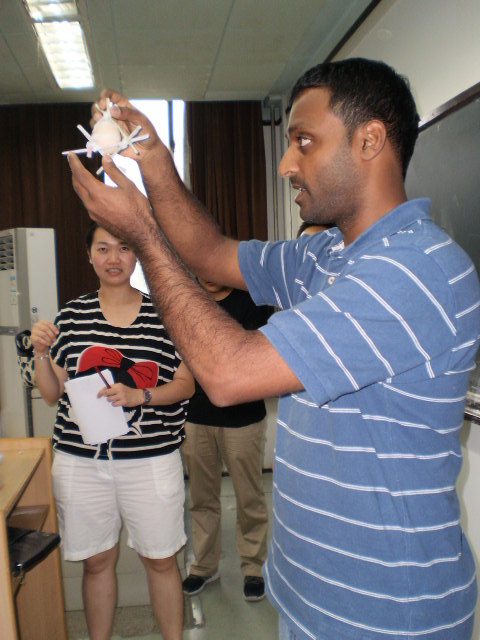Roshan Yoganathan went from playing with homemade volcanoes and other science experiments to helping develop medical devices the size of a grain of rice. A passion for science and healthcare led Roshan to a career as a biomedical scientist. Working on the cutting edge of technology means a scientist has to be on the move. Roshan’s career has taken him around the globe; starting out in his hometown of Toronto, Roshan relocated to the Australian shore, then Los Angeles, and recently to his current home in San Francisco. As he works on developing devices designed to help people living with diseases like Type 2 Diabetes, Roshan hopes to make a difference in the world.
Can you explain what you do?
 I’m a scientist. I do experiments to test devices that you can put in your body. For example, right now I am part of a team that is working on a device that is the size of a grain of rice, made of titanium. It’s loaded with a drug and is designed to go under the skin. Before we start human clinical trials, we need to test how much of the drug it releases in animals. Once the tiny devices are implanted in animals, we take blood from the animal and measure the amount of drug in the blood. If the device is safe in the animal and is releasing the right amount, then we can go on to the next stage and start testing it with humans. The device and drug we are testing right now is for people with Type 2 Diabetes. People with this disease need daily or weekly injections, so instead, patients could get this small implant that goes under their skin and stays there for six months. That way, patients don’t need to do injections as often. Eventually, we will expand so the device will dispense different drugs to help other people with other diseases.
I’m a scientist. I do experiments to test devices that you can put in your body. For example, right now I am part of a team that is working on a device that is the size of a grain of rice, made of titanium. It’s loaded with a drug and is designed to go under the skin. Before we start human clinical trials, we need to test how much of the drug it releases in animals. Once the tiny devices are implanted in animals, we take blood from the animal and measure the amount of drug in the blood. If the device is safe in the animal and is releasing the right amount, then we can go on to the next stage and start testing it with humans. The device and drug we are testing right now is for people with Type 2 Diabetes. People with this disease need daily or weekly injections, so instead, patients could get this small implant that goes under their skin and stays there for six months. That way, patients don’t need to do injections as often. Eventually, we will expand so the device will dispense different drugs to help other people with other diseases.
What is the day to day of your job like?
The company I’m at is a startup, so I’m constantly working on multiple projects.. Sometimes I’m in the lab and other times I’m at my desk analyzing the data. I communicate with outside companies that do the animal testing for us, as well as outside companies that manufacture the parts for us or companies that help us with our FDA applications. I wear many hats and enjoy being involved with different parts of the product we are working on.
You’ve mentioned communication skills being key. Can you explain why?
 Communication skills are important because you have to be able to explain complicated products to others, including regulatory people. These are the people who are going to put the submission documentation together for the government, or they could also be from the FDA. We get questions back from the government and when we answer those we need to be able to communicate clearly without confusing anyone or going into too much detail.
Communication skills are important because you have to be able to explain complicated products to others, including regulatory people. These are the people who are going to put the submission documentation together for the government, or they could also be from the FDA. We get questions back from the government and when we answer those we need to be able to communicate clearly without confusing anyone or going into too much detail.
How did you become interested in the career?
Originally, I wanted to be a doctor but I decided to go into engineering first. I realized I am more of a problem solver. I like to figure things out from the beginning. I feel medicine required more memorization, so that’s why I thought it wasn’t the right fit for me. I decided to take a different path and work at the interface of engineering and healthcare and try to help people. It’s a career for people who like engineering, math, and physics and who also want to help people. I want to get a product out there that will make a difference
Did anything else inspire you to choose a career that helps people with medical issues?
The company I worked at after I got my PhD was working on a small injectable for ovarian cancer. One of my aunts had ovarian cancer and passed away just before I started working there. That is one of the instances that drew me toward disease health care. A lot of my Dad’s family has diabetes and two of my grandparents had dementia. These diseases are common in a lot of families; everyone knows someone who has had cancer or some kind of compromising disease. So, it’s motivation for me; I want to help families who are dealing with these diseases.
What has been the most rewarding moment of your career?
I used to work for another company and was involved with a submission for a new pacemaker. I was part of the core team who put the documentation together. We sent it to the government and got the feedback, then was involved with addressing that feedback because our initial submission wasn’t successful. Recently, I was very happy to learn that the device was approved. Even though I am no longer part of that company, I was part of the original team that put everything together and planned out what needed to happen to get it approved. Getting it approved is a big deal because then you get it on the market and see people using it.
What sacrifices did you have to make when you began your career?
It was low pay when I first started. I’ve also moved around quite a bit, which is a mandatory part of working in this field.. I’ve lived in three countries. I am from Canada, I lived in Australia for about five or six years and now I’ve been in the States for about five years. You have to be open to moving around if you want to be working at the cutting edge of technology because you’ll have to go where the interesting stuff is. So if you like living in different countries then this might be a good job for you.
Did you ever have any bad experiences while moving around?
While I was getting my PhD in Australia, I’d stay at someone’s place who lived near the beach. There was always sand everywhere and sometimes I stayed in places where there were cockroaches. But you have to keep in mind it’s temporary; it’s just to get you through your PhD. You just have to grit your teeth and get through it sometimes.
What clubs should high school students join if they are interested in pursuing a career in biomedical science?
I was part of the math club but I was also in the athletics club. I enjoyed organizing tournaments and leagues for other people. If you want to oversee large studies or large research programs, it’s helpful to be part of a club where you can organize events for others. It will give you the opportunity to work on your organizational and communication skills which are key skills for the job.
마지막으로 하고 싶은 조언이 있나요?
If you enjoy science a lot don’t let failure deter you; we know a lot of what we know today through trial and error and experimentation.


